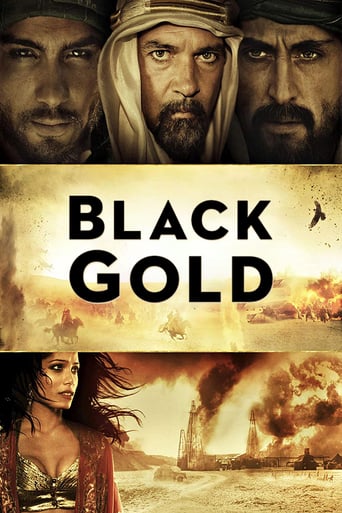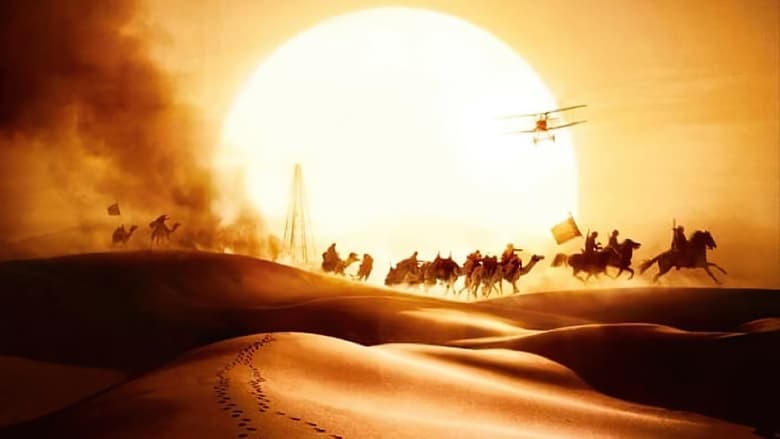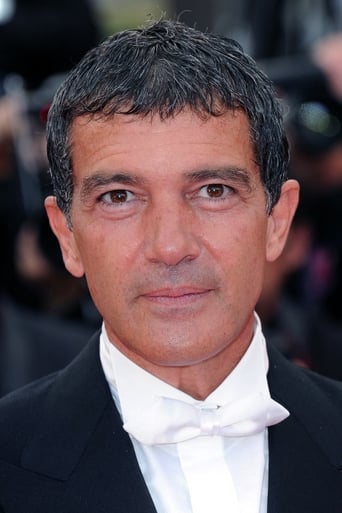Black Gold (2013)
On the Arabian Peninsula in the 1930s, two warring leaders come face to face. The victorious Nesib, Emir of Hobeika, lays down his peace terms to rival Amar, Sultan of Salmaah. The two men agree that neither can lay claim to the area of no man’s land between them called The Yellow Belt. In return, Nesib adopts Amar’s two boys Saleeh and Auda as a guarantee against invasion. Twelve years later, Saleeh and Auda have grown into young men. Saleeh, the warrior, itches to escape his gilded cage and return to his father’s land. Auda cares only for books and the pursuit of knowledge. One day, their adopted father Nesib is visited by an American from Texas. He tells the Emir that his land is blessed with oil and promises him riches beyond his wildest imagination. Nesib imagines a realm of infinite possibility, a kingdom with roads, schools and hospitals all paid for by the black gold beneath the barren sand. There is only one problem. The precious oil is located in the Yellow Belt.
Watch Trailer
Cast


Reviews
The Worst Film Ever
the audience applauded
Good movie, but best of all time? Hardly . . .
Admirable film.
This is the story of how the Arab tribes became united by war, to become Saudi Arabia. Antonio Banderas stars as Emir Nesib who bartered a deal with the United States for the oil. He was able to buy off most of the other tribes except for one, who believed the infidels of the west should leave their land.While the movie is fictional, it reflects the conflict that goes on within the world of Islam today. Antonio Banderas, with his Spanish accent was as convincing as an Arab as Sean Connery with his Scottish accent was as convincing as a Russian submarine captain. In other words, he pulls it off.The characters are western stereotypes of Arab culture. They are played well, if you are into the stereotype.What was with the harem outfit on Frieda Pinto?Parental Guide: No f-bombs, sex, nudity.
The Arab world. a portrait created using cliches and mixed stories and confrontations scenes. and personal stories. the result is far to be remarkable. but decent. and interesting. and that fact is the basic motif for see it. sure, for a part of cast, for landscapes and for fragments of plot. but important is the detail than it is better than more of its public expectations. and this represents a good point.
Antonio Banderas playing an Arab? This has to be a mistake.The main thing this movie does is to confuse you as to what era you're in, it starts off cheesy Hollywood, then moves into Lawrence of Arabia, then Dune, then confounds most of the rules of Hollywood cinema and creates something different.It drew me in, I couldn't help it, I literally sat on the edge of my seat (literally means I actually did it).It's a pseudo-history romp through the desert, it's a coming of age story and there's a bit of romance.It's more true to how history generally unfolds than most movies and I feel it's more true to how people really feel and act.I thought I knew what would happen at some points but I was time and again proved wrong.It's a strange cocktail of genius, I loved it, so I'm not going to review it technically, there's no point.
I suppose this would have been a lot more interesting if there's some truth ringing in it, versus having to base it on fictitious elements that are seductively compelling if based on a true story about the founding of a nation. It had ambitions to be as epic as Lawrence of Arabia, but this Doha Film Institute backed film set in the early 1900s is probably one of the first being sponsored by an Arab nation, to tell a story about Arabs in the Arabian land. And curious enough, it laid down some lessons learnt about the insatiable demand and corruption of morals that oil and its wealth bring, yet also provided a balanced view on how such wealth, if used judiciously, could benefit subjects of its kingdom.And that view of being backward, and needing to propel themselves forward to be on par with the Western nations, is held keenly by Emir Nesib (Antonio Banderas), whose kingdom gets ravaged by disease once too many times, and laments that he rules over nothing but endless sand. That is until the Texan Oil company reveals the abundance of oil underneath that will bring about riches to the tune of 100,000 barrels of crude per day at US$1 per barrel, per oil well. Do the math, and any kingdom will open its coffers to that kind of money. Except for Nesib's rival Sultan Amar (Mark Strong), the weaker of the two kingdoms who had agreed upon an uneasy truce with Amar giving up his two sons to Nesib, for the latter to raise, which will effectively guarantee no further attempts of an invasion or war.The story soon shifts to more politicking many years later, with the realization of god provided riches buried underneath, that eyes are now turned toward milking a piece of No Man's Land. The next act deals with the many politicking and schemes from Nesib, who decides to negotiate a new contract, and cunningly uses Amar's sons Saleeh (Akin Gazi) and Auda (Tahar Rahim) as barter, in addition to Auda's marriage to Nesib's daughter Leyla (Freida Pinto) as leverage, effectively making the two houses relatives. And this is just the tip of the iceberg, before it ventures into action-adventure tradition, hinged with a certain amount of spirituality about being the chosen one and all that jazz, with the rise of a saviour that will unite all tribes and decide whether to consort with oil money from the West.Director Jean-Jacques Annaud's film has many ideas put together into one long narrative, which if given the time to develop, would have been an epic. Unfortunately, time is not provided, and the film had to be told at such a pace, things seem to happen in linear fashion without much reason, other than to try and squeeze as many elements as possible into a film. Things like the ideological battle between forward thinkers and traditionalists, and the battle between different schools of religious thoughts, make the film richer than it could be, adding a little contemporary slant where moderates have to battle extremists, and those who interpret texts selectively for their own advantage. The word "infidel" is used countless of times in various contexts, and it would have been nice if these subplots were developed further, rather than becoming just a footnote that was in the way, to be brushed aside soonest possible.Those into action have adequately crafted battle sequences in the desert, where Auda becomes like Dune's Paul Atreides in seeing his knowledge gained from extensive book research translate to very effective battle strategies, complete with fights on horseback and camel-back, while extrapolating the modern versus traditional theme in having swords go up against mechanized weapons from tanks to airplanes. Production values in all aspects are kept exceptionally high and lush, from costumes to sets out there in desert land, with many scenes done the old school way rather than to chalk up numbers through CG.One may also be attracted by the ensemble star cast assembled for the film, with the likes of Antonio Banderas and Mark Strong as rivals, though the latter had reduced screen time when compared to the former, which was a more interesting character for his moral ambiguity, never shying away to offer a bribe to have things done his way, versus Strong's Amar that was the contrast upright, though uptight, ruler who is almost resigned to his fate that he cannot change history. Both make way for the younger cast such as Tahar Rahim, who is excellent as the narrative shifts its focus to chart his character's meteoric rise utilizing traits earned and learned from both fathers, while Freida Pinto was sorely under-utilized.The film may at certain junctures behave a little xenophobic given its characters' rather vocal opposition of Westerners and their presence, although nailing it in the head to comment on their unending thirst for oil, but the irony is that many characters were played by non-Arabs, most likely to sell the movie abroad.









